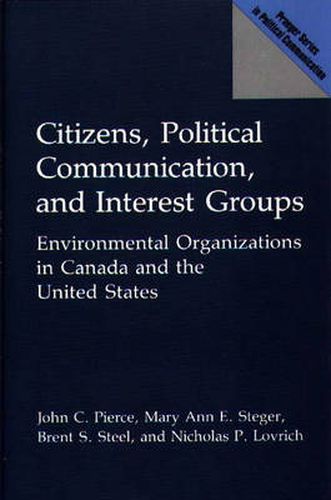Readings Newsletter
Become a Readings Member to make your shopping experience even easier.
Sign in or sign up for free!
You’re not far away from qualifying for FREE standard shipping within Australia
You’ve qualified for FREE standard shipping within Australia
The cart is loading…






This text investigates the technical information quandary created by post-industrial changes, which have produced demands for citizen involvement in public policy processes, while complex scientific and technical issues increasingly make public involvement difficult. Authors Pierce, Steger, Steel and Lovrich address the degree to which interest groups might serve to bridge the knowledge gap between public policy processes and the citizenry in US and Canadian settings. The focus of the study is on acid rain policy in Michigan and Ontario, an area of considerable scientific and technical complexity as well as of political and public interest. The authors examine how the US and Canadian publics acquire, process and communicate policy-relevant information so that it can influence policymaking. The book poses relevant questions. For example, do interest groups play the information dissemination role in a manner that could address the technical information quandary? Are interest groups playing the same or different roles in the United States and Canada? And, what different factors cause the US and Canadian interest groups to behave as they do in the political arena? This work is recommended for the use of scholars of political science, communication, environmental studies and comparative public policy.
$9.00 standard shipping within Australia
FREE standard shipping within Australia for orders over $100.00
Express & International shipping calculated at checkout
This text investigates the technical information quandary created by post-industrial changes, which have produced demands for citizen involvement in public policy processes, while complex scientific and technical issues increasingly make public involvement difficult. Authors Pierce, Steger, Steel and Lovrich address the degree to which interest groups might serve to bridge the knowledge gap between public policy processes and the citizenry in US and Canadian settings. The focus of the study is on acid rain policy in Michigan and Ontario, an area of considerable scientific and technical complexity as well as of political and public interest. The authors examine how the US and Canadian publics acquire, process and communicate policy-relevant information so that it can influence policymaking. The book poses relevant questions. For example, do interest groups play the information dissemination role in a manner that could address the technical information quandary? Are interest groups playing the same or different roles in the United States and Canada? And, what different factors cause the US and Canadian interest groups to behave as they do in the political arena? This work is recommended for the use of scholars of political science, communication, environmental studies and comparative public policy.